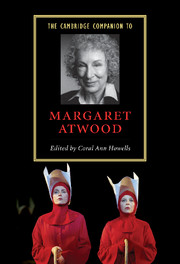Book contents
- Frontmatter
- Introduction
- 1 Margaret Atwood in her Canadian context
- 2 Biography/autobiography
- 3 Power politics: power and identity
- 4 Margaret Atwood’s female bodies
- 5 Margaret Atwood and environmentalism
- 6 Margaret Atwood and history
- 7 Home and nation in Margaret Atwood’s later fiction
- 8 Margaret Atwood’s humor
- 9 Margaret Atwood’s poetry and poetics
- 10 Margaret Atwood’s short stories and shorter fictions
- 11 Margaret Atwood’s dystopian visions: The Handmaid’s Tale and Oryx and Crake
- 12 Blindness and survival in Margaret Atwood’s major novels
- Further Reading
- Index
3 - Power politics: power and identity
Published online by Cambridge University Press: 28 November 2006
- Frontmatter
- Introduction
- 1 Margaret Atwood in her Canadian context
- 2 Biography/autobiography
- 3 Power politics: power and identity
- 4 Margaret Atwood’s female bodies
- 5 Margaret Atwood and environmentalism
- 6 Margaret Atwood and history
- 7 Home and nation in Margaret Atwood’s later fiction
- 8 Margaret Atwood’s humor
- 9 Margaret Atwood’s poetry and poetics
- 10 Margaret Atwood’s short stories and shorter fictions
- 11 Margaret Atwood’s dystopian visions: The Handmaid’s Tale and Oryx and Crake
- 12 Blindness and survival in Margaret Atwood’s major novels
- Further Reading
- Index
Summary
“The personal is political”
This well-known feminist slogan from the 1970s provides an adequate synopsis of Margaret Atwood's poetry collection Power Politics (1971). Atwood has always been concerned with the interface between the public and the personal worlds, and she has often referred to the blurry boundaries between them. In fact, as she explains, she chose this title for the collection because she saw this same phrase in a letter written to her by a friend and in a newspaper. For her the poems “exist between letter and newspaper, the so-called public world and the so-called personal world.” Coming at the beginning of her manifesto on power, “Notes on Power Politics” (1973), the following passage spells out the writer’s attitude to this issue. According to Atwood, power circulates like a kind of energy and permeates all relations within a society:
Power is our environment. We live surrounded by it: it pervades everything we are and do, invisible and soundless, like air . . .
We would all like to have a private life that is sealed off from the public life and different from it, where there are no rulers and no ruled, no hierarchies, no politicians, only equals, free people. But because any culture is a closed system and our culture is one based and fed on power this is impossible, or at least very difficult . . . So many of the things we do in what we sadly think of as our personal lives are simply duplications of the external world of power games, power struggles.
(“Notes on Power Politics,” p. 7)- Type
- Chapter
- Information
- The Cambridge Companion to Margaret Atwood , pp. 43 - 57Publisher: Cambridge University PressPrint publication year: 2006
- 4
- Cited by



